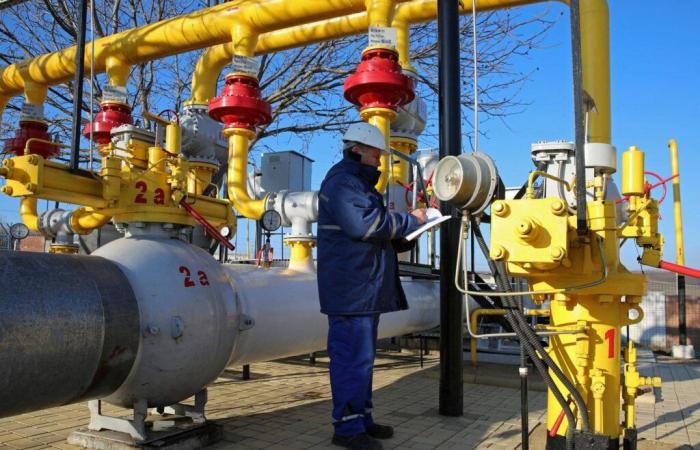The winter promises to be difficult for Moldova. On December 28, the Russian gas giant Gazprom announced that it would stop, as of January 1, sending gas to this small landlocked country between Romania and Ukraine. This announcement follows Ukraine's refusal to allow the transit of Russian gas through its territory to its European customers beyond December 31, 2024. It mainly results from Moscow's desire to put pressure on pro-European authorities. Moldovans.
The consequences promise to be serious for the inhabitants of the country. Although Moldova has been without Russian gas for heating since 2022, the country still remains very dependent on this energy source for its electricity production: 70% of its electricity supply comes from the powerful Kuchurgan thermal power station, located in Transnistria.
This pro-Russian separatist territory, where around 1,500 soldiers under the command of Moscow are stationed, has escaped the control of Chisinau since 1992. However, this plant is supplied with Russian gas, which Gazprom delivers almost free of charge to the separatist regime. If it no longer produces, Moldova risks a blackout.
The end of deliveries also puts Transnistria on the brink of collapse. Because if Moldova no longer depends on Russian gas to heat itself and run its industry, this is not the case for this territory located on the left bank of the Dniester river, where around 300,000 people live. Deprived of this windfall, the factories of this industrial region will quickly shut down, and the houses will freeze.
Transnistria's separatist authorities announced a package of emergency measures, including distance learning and central heating cuts. However, it is difficult to measure whether this situation affects confidence in Moscow in this predominantly Russian-speaking region, with a locked political and media landscape.
“Deliberate security crisis”
«This is not an energy crisis, but a deliberate security crisis” provoked by Russia, denounced Moldovan Prime Minister Dorin Recean, who accuses Moscow of “take hostage” the inhabitants of Transnistria. Moscow could in fact have continued to deliver gas to Moldova without going through Ukraine, via the Black Sea, Turkey and the Balkans. But Russia would have conditioned this solution on the payment of a large debt, the amount of which Chisinau disputes. The Moldovan authorities see this as a way for Moscow to shift responsibility for an artificial crisis, designed to destabilize the country's pro-European government.
In office since 2020, President Maia Sandu, of the Action and Solidarity Party (PAS), was re-elected in October 2024 at the end of a campaign marked by unprecedented Russian interference operations. The legislative elections which must be held by July 2025 promise to be difficult for PAS. An energy crisis would be likely to put wind in the sails of pro-Russian competitors or those in favor of the country's neutrality, quick to praise the reestablishment of imports of cheap Russian gas. Their victory in the legislative elections could compromise Moldova's European trajectory.
The country appears insufficiently prepared for the looming crisis. Having failed to build up gas stocks earlier in the year, a 30% increase in energy prices was passed on from December, despite previous promises from the government. Considered responsible for the situation, Energy Minister Victor Parlicov was dismissed in early December by Prime Minister Dorin Recean, who took over his portfolio and declared a state of energy emergency.
Hope for reunification?
Several observers joined by The Cross however, share the feeling that the Moldovan government, more broadly, has not taken the possibility of a gas cut seriously enough, counting instead on a reduction in deliveries. Friday, December 27, the day before Gazprom's announcement, Deputy Prime Minister responsible for reintegration Oleg Serebrian still expressed his circumspection in the face of this worst-case scenario. He claimed not to “not seeing the logic of a complete shutdown of supplies», Transnistria, a vassal of Moscow, would suffer so much.
Some experts have suggested that this crisis could force Transnistria to reintegrate into Moldova. Chisinau could indeed come to the aid of the separatist region by delivering the gas it needs, in exchange for political concessions. It remains to be seen who would foot the bill.
Estimates put the amount of gas that Gazprom delivered almost free of charge each year to Transnistria to artificially keep it alive at between 300 and 400 million euros – the equivalent of 2% of Moldovan GDP. It is hard to imagine how Chisinau could compensate for such a loss on its own.
“This crisis can bring the two shores closer together, but I do not believe that reintegration is possibletempers Irina Tabaranu, co-founder of the media Zona de Securitate, which covers news from the separatist region. Russian troops will not leave with the gas. And the Chisinau government lacks the financial and human resources to manage reintegration. This crisis only highlights this problem. »






